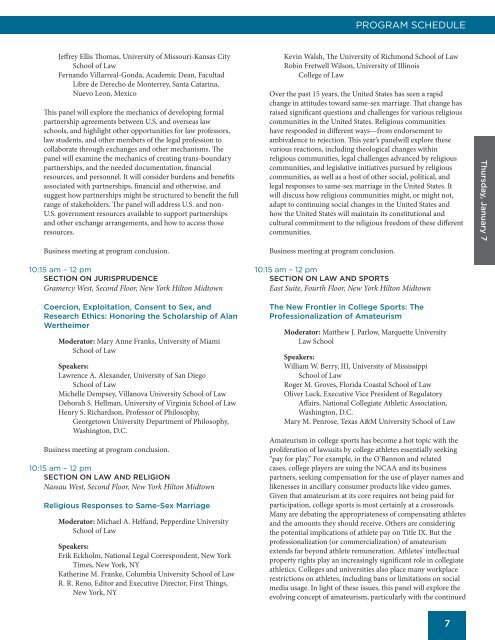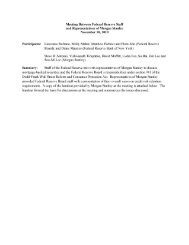Create successful ePaper yourself
Turn your PDF publications into a flip-book with our unique Google optimized e-Paper software.
PROGRAM SCHEDULE<br />
Jeffrey Ellis Thomas, University of Missouri-Kansas City<br />
School of Law<br />
Fernando Villarreal-Gonda, Academic Dean, Facultad<br />
Libre de Derecho de Monterrey, Santa Catarina,<br />
Nuevo Leon, Mexico<br />
This panel will explore the mechanics of developing formal<br />
partnership agreements between U.S. and overseas law<br />
schools, and highlight other opportunities for law professors,<br />
law students, and other members of the legal profession to<br />
collaborate through exchanges and other mechanisms. The<br />
panel will examine the mechanics of creating trans-boundary<br />
partnerships, and the needed documentation, financial<br />
resources, and personnel. It will consider burdens and benefits<br />
associated with partnerships, financial and otherwise, and<br />
suggest how partnerships might be structured to benefit the full<br />
range of stakeholders. The panel will address U.S. and non-<br />
U.S. government resources available to support partnerships<br />
and other exchange arrangements, and how to access those<br />
resources.<br />
Kevin Walsh, The University of Richmond School of Law<br />
Robin Fretwell Wilson, University of Illinois<br />
College of Law<br />
Over the past 15 years, the United States has seen a rapid<br />
change in attitudes toward same-sex marriage. That change has<br />
raised significant questions and challenges for various religious<br />
communities in the United States. Religious communities<br />
have responded in different ways—from endorsement to<br />
ambivalence to rejection. This year’s panelwill explore these<br />
various reactions, including theological changes within<br />
religious communities, legal challenges advanced by religious<br />
communities, and legislative initiatives pursued by religious<br />
communities, as well as a host of other social, political, and<br />
legal responses to same-sex marriage in the United States. It<br />
will discuss how religious communities might, or might not,<br />
adapt to continuing social changes in the United States and<br />
how the United States will maintain its constitutional and<br />
cultural commitment to the religious freedom of these different<br />
communities.<br />
Thursday, January 7<br />
Business meeting at program conclusion.<br />
10:15 am – 12 pm<br />
SECTION ON JURISPRUDENCE<br />
Gramercy West, Second Floor, New York Hilton Midtown<br />
Coercion, Exploitation, Consent to Sex, and<br />
Research Ethics: Honoring the Scholarship of Alan<br />
Wertheimer<br />
Moderator: Mary Anne Franks, University of Miami<br />
School of Law<br />
Speakers:<br />
Lawrence A. Alexander, University of San Diego<br />
School of Law<br />
Michelle Dempsey, Villanova University School of Law<br />
Deborah S. Hellman, University of Virginia School of Law<br />
Henry S. Richardson, Professor of Philosophy,<br />
Georgetown University Department of Philosophy,<br />
Washington, D.C.<br />
Business meeting at program conclusion.<br />
10:15 am – 12 pm<br />
SECTION ON LAW AND RELIGION<br />
Nassau West, Second Floor, New York Hilton Midtown<br />
Religious Responses to Same-Sex Marriage<br />
Moderator: Michael A. Helfand, Pepperdine University<br />
School of Law<br />
Speakers:<br />
Erik Eckholm, National Legal Correspondent, New York<br />
Times, New York, NY<br />
Katherine M. Franke, Columbia University School of Law<br />
R. R. Reno, Editor and Executive Director, First Things,<br />
New York, NY<br />
Business meeting at program conclusion.<br />
10:15 am – 12 pm<br />
SECTION ON LAW AND SPORTS<br />
East Suite, Fourth Floor, New York Hilton Midtown<br />
The New Frontier in College Sports: The<br />
Professionalization of Amateurism<br />
Moderator: Matthew J. Parlow, Marquette University<br />
Law School<br />
Speakers:<br />
William W. Berry, III, University of Mississippi<br />
School of Law<br />
Roger M. Groves, Florida Coastal School of Law<br />
Oliver Luck, Executive Vice President of Regulatory<br />
Affairs, National Collegiate Athletic Association,<br />
Washington, D.C.<br />
Mary M. Penrose, Texas A&M University School of Law<br />
Amateurism in college sports has become a hot topic with the<br />
proliferation of lawsuits by college athletes essentially seeking<br />
“pay for play.” For example, in the O’Bannon and related<br />
cases, college players are suing the NCAA and its business<br />
partners, seeking compensation for the use of player names and<br />
likenesses in ancillary consumer products like video games.<br />
Given that amateurism at its core requires not being paid for<br />
participation, college sports is most certainly at a crossroads.<br />
Many are debating the appropriateness of compensating athletes<br />
and the amounts they should receive. Others are considering<br />
the potential implications of athlete pay on Title IX. But the<br />
professionalization (or commercialization) of amateurism<br />
extends far beyond athlete remuneration. Athletes’ intellectual<br />
property rights play an increasingly significant role in collegiate<br />
athletics. Colleges and universities also place many workplace<br />
restrictions on athletes, including bans or limitations on social<br />
media usage. In light of these issues, this panel will explore the<br />
evolving concept of amateurism, particularly with the continued<br />
7



